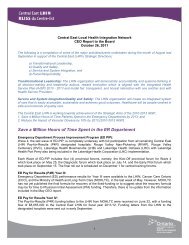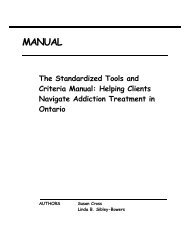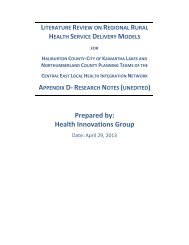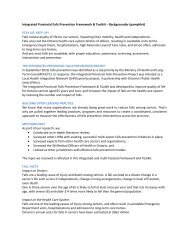CDE Appendix 1 Literature Review - Central East Local Health ...
CDE Appendix 1 Literature Review - Central East Local Health ...
CDE Appendix 1 Literature Review - Central East Local Health ...
Create successful ePaper yourself
Turn your PDF publications into a flip-book with our unique Google optimized e-Paper software.
The Culture, Diversity and Equity Project: <strong>Literature</strong> <strong>Review</strong><br />
There is a corresponding neglect or under-emphasis of skills-focused training interventions (Curtis et al., 2007;<br />
Engerbretso et al., 2008).<br />
Curtis et al., moreover, cite research findings that suggest “even if measurable attitudinal change does occur as a<br />
reported consequence of [such attitude-based] training, attitudinal change does not necessarily result in<br />
changed behaviour” (see also Armour, Bain, & Rubio, 2004; Bieschke et al., 2003; Tomlinson-Clarke 2000).<br />
(3) Stereotyping<br />
Another limitation associated with knowledge-based approaches to cultural competence training concerns the<br />
persistence of stereotyping teaching strategies that depict groups in static, homogeneous ways (Betancourt et al.,<br />
2005; Engerbretso et al., 2008). The failure to recognize the complexity of individual cultural identity and<br />
formation, can lead to misdiagnosis and culturally incompetent care. Frequently, such ‘categorical’ approaches to<br />
training focusing on the particular cultural norms of particular ethnic groups, moreover, fail to address and account<br />
for the cultural orientation of the dominant health care system and its providers (Engerbretson et al., 2008).<br />
(4) Lack of standards and criteria for assessment<br />
While cultural competence education for medical/healthcare professionals in training in universities and colleges has<br />
grown in sophistication and consistency as a result of the introduction of accreditation standards, continuing cultural<br />
competence education for practicing health care professionals has been described as “increasingly haphazard and<br />
varying in quality” (California Endowment, 2003). One of the major reasons for this is the lack of agreed upon<br />
standards and evaluative criteria by which to plan or assess cultural competence training for existing healthcare<br />
professionals (ibid.).<br />
(5) Training as substitute for organizational change<br />
A last salient limitation or critique of cultural competence training in the literature is the false sense of<br />
accomplishment this can bestow on organizations providing it. Cross et al.’s (1989) cultural competence continuum<br />
for assessing organizations is telling in this respect as it situates organizations at the pre-competence phase as<br />
frequently and inordinately focussing on training and diverse staff hiring, yet too often to the neglect of more<br />
fundamental and systemic changes in the way business is conducted in the organization.<br />
Cultural competence training – most of which tends to focus on improving individual staff attitudes, knowledge, and<br />
behaviour - is a necessary but insufficient condition (and certainly no substitute) for improving the cultural and<br />
linguistic appropriateness and accessibility of programs and services.<br />
5.4. BEST PRACTICES & RECOMMENDATIONS<br />
Among the salient recommendations and best practices identified in this review of the cultural competence training<br />
literature are:<br />
• Evaluating - and properly designing evaluations (e.g. experimental pre/post-test designs using validated<br />
instruments) of - training programs for their impact on trainees behaviour as well as client health outcomes<br />
(Gozu et al., 2007; Curtis et al., 2007).<br />
• Developing greater (evidence-based) consensus on training standards and evaluative criteria for cultural<br />
competency training and skills assessment. This is a particularly important priority in the field of continuous<br />
education for existing health care professionals (OMH, 2001; Betancourt, 2005).<br />
• Focusing on skills versus solely attitudes and knowledge in training modules by employing a practiceoriented,<br />
skills-based approach to training that focuses on specific competencies and skills required to<br />
function culturally competently in a particular organizational setting (Engerbretso et al., 2008).<br />
Taking a systems approach to cultural competence training. A systems approach treats training as a “key<br />
component of a health care organization’s strategic approach to organizational performance”, and links it to the<br />
105

















